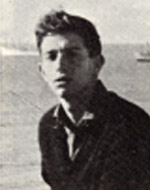Katz, Matti
Son of Moshe HaKohen and Tzipora. He was born on the 17th of Kislev, December 3, 1944, in Tel Aviv. He attended the “Nevo” elementary school, and the “New High School.” He was an active member of the Mahanot Ha’olim youth movement, and served as a guide. He was interested in the fields of science and history, and discovered a talent for painting and writing, especially for poetry. When he completed his matriculation exams, Matti went to the Habashor group, and underwent a brigade commander’s course. He insisted on returning to serve as a combat soldier, took a course in liaison, and became a company liaison. Matti’s inner openness to man, his serious attentions to his grief and distress, are what gave rise to the affection and esteem of his friends, as attested by the sincere words of his army friend. See Hebrew translation for full letter. On the night of the 28th of Av, August 6, 1964, Matti volunteered to leave with a squad, on the border. The force encountered an ambush, and he fell during this battle. He was Nineteen and a half. He left behind his parents and a sister. He was laid to rest in the military cemetery in Kiryat Shaul. After he fell, his parents found in his room a book of thought, which he wrote, as summaries of his thoughts, and a notebook of poems, which were an expression of his personal experiences. Some of these poems appeared in the newspaper immediately afterwards, and among the many who admired the songs was poet Natan Alterman. With Alterman’s encouragement, the family published the anthology of Matti’s poems “When the Sun Comes,” on the anniversary of his death. The songs also touched the hearts of many artists who were friends of Matti’s father, the founder of the Katz Art Gallery, the first gallery in Tel Aviv, who contributed their works, and in cooperation with the Writers’ Union. Famous Israeli composers, such as Paul Ben Chaim, Zvi Avni and others, whose songs also moved them, composed music that was played all over the world, and recorded on a CD, that also included reading the songs. In the preface to Alterman’s book of poems, Alterman wrote: “In this notebook were gathered the first poems, which are now his last poems, the beginning of the road, and the end, standing so close to each other, that there is no gap between them…. The reader who takes this bundle of songs … The soul of a boy who stood on the edge of the world….(This page is part of the Yizkor memorial project held by the Ministry of Defense)
